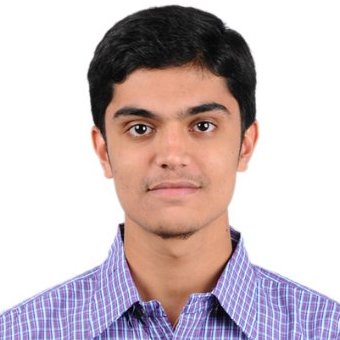
Back-Story
Hello guys, I am Abijith, third year EEE. I had this opportunity among many opportunities to interview and talk to Gaurav. In my two years of IEEE and NITK life, I have been in touch with him for only one semester, because he took a semester off in his 7th semester. That semester has been the best academic semester for me. The discussions, the treats, the interactions, the projects, the amount of knowledge that this person has! Oh good lord!
Anyway, without any further ado, presenting Gaurav. Note: Questions are in bold
What is math to you?
Mathematics is about ideas to me. It does have its applications in say DSP or computers. Imagine this: There is a huge tank of all ideas possible in the world, and you are slowly siphoning the ideas from it and mostly claim that it’s purely your own. The link between the two is mathematics. So you can say I understand myself through maths. But again, I know mathematics is limited. It is a creation of the human mind just like the idea of human rights or nations or religion. Fictions help us to cooperate on a massive scale and keep the world running. So I think to truly understand oneself is going beyond mathematics and that’s, according to me, is not following the conventional God either. So mathematics is a start towards that end. Plus there are smaller benefits of understanding mathematics. I’ll understand engineering better, or as a matter of fact everything in the world too. I don’t remember who said this but the saying goes something like, “Everything can be modelled by mathematics except that you need to know that much mathematics”. There are obvious objections to this though like Godel’s theorem. But anyway, I’m trying to understand it too. Overall, I’m not sure, probably it’s just my experiment just like everything we see such as science, engineering, complex social structures are human experiments.
Is engineering the best way to see math?
I think the converse is true! Mathematics, in my opinion, would be the best way to see engineering. But it all depends on what we agree as the definition of “see”. If we take it as understanding the ideas behind it, then yes what I said holds in my opinion. But if it means to build things and see stuff in action, engineering is engineering. It’ll be the best way to see math in action!
What is your approach while learing math?
I read theorems, try to prove them myself. Sometimes it takes 2 days sometimes a day. If I don’t get it and I feel bored to pursue myself I see the proofs online. I only read from books. Never courses online. I want to find the mathematical ideas than simply “learn”.
With all the ML hype and everyone wanting to learn and “do” ML, what is your take on.. from scipy import SVM
If the “learning” in question is satisfied with good implemention of algorithms, you just need to learn the algorithms. If you want to come up with algorithms, you need stronger basics in how to build those algorithms. And if you want to “understand” the algorithms and play with it, you need mathematics. If you want to question the very foundations you need to go deeper into mathematics. For example, say you want to implement “conscious algorithms”. Probably we might have to dig as deep down as to understand Turing machines and it’s variants. Every computer is an approximation of a Turing machine. We have consiousness. We compute. But are we approximations of the turing machine itself? Biological Turing machines. Or are we more than that? Less than that? Or something else entirely?
For someone in engineering school wanting to do mathematics, what’s the best way out OR what’s the field in engineering closest to math.
Depends on your attitude towards engineering. Or probably attitude towards life. If you speak only in terms of career, then you can try CMI, HRI, and everything else to change your career limitations, in India, for Master of Mathematics or MSc. In engineering, I don’t think pure mathematics is done anywhere. Probably go with robotics or something and take more math electives. But if you want to do mathematics to understand it, then just do mathematics. Fermat was a lawyer.
What are your future plans after EC at NITK?
I’ll study mathematics, understand history, enjoy the process, try reaching my self-assumed goals. Everything else is for survival or to meet my basic needs. Of course, I’ll explore other ideas, fields, understand existing orders, geopolitics, herblore, biology.. There’s no end.
Biology?!
Yeah. Botany, creatures and stuff. Like do you know that there are creatures living on us simulating the same evolution and natural selection on our bodies just like the ecosystems that existed on earth before? Bacteria and fungi. Plus the first layer of defence is not just skin. Its the bacterias that live on the skin itself. I have poor memory so I don’t remember the names of these bacterias. They survive even with the soap stuff. Supposedly if you remove every bacteria in our body, we’d die. So you can fundamentally question our general attidue of disgust against these bacterias. So body is like earth, shared between many other creatures.
What’s one thing you want to tell first-year Gaurav?
Seriously, all these advices and stuff throw it out the window. Everything “good” in sometime will be bad in some other time. For instance science. If you go back few hundred years, doing science [you had to do it in secret] was “bad” because it was going against the existing religious establishments. Now, “science” is good. Who knows what is in future.
Thanks for your time, Gaurav
The last one was a trick question in having to advice juniors. He believes in the ideas and not the person telling them. I remember one thing that he advised when talking about grades and courses that I don’t like. He said, “Even I don’t like a lot of things. I don’t do them! You can’t force someone to do something he/she doens’t like.” If I had to take a lesson from Gaurav, it would be the following. Do what you want to do well, don’t think about anything other than that. Your current situation might support your interest, it might not; but if you forego your interests, it might have never been one. Dedication is key, rewards and awards will come when they will. But what you learn has a timeline and there is no going back. When you learn something, do it with all the interest you have, do it because you want to and not because someone else wants you to, or for something else. It is giving respect to what you’re learning by devoting the time that it deserves.
